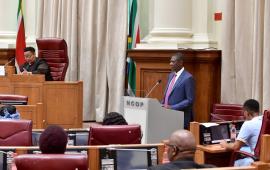
Deputy President Paul Mashatile has told the National Council of Provinces (NCOP) that government has no cadre deployment policy, legislation or procedure.
“Nonetheless, the ANC established a cadre development and deployment process after the democratic breakthrough in order to safeguard democracy and good governance, while assuring rapid and purposeful transformation,” he said on Thursday.
The Deputy President was responding to a question in Parliament about whether cadre deployment has led to a lack of service delivery, as many officials in municipalities are unqualified to undertake the necessary infrastructure maintenance, leading to excessive sewer spillages.
Mashatile explained that the logic behind establishing a cadre development and deployment process is to ensure that the most suitable practices are used in recruitment and prioritising the appropriate placement of skills, especially during the transition period and beyond.
“The process of appointing Mayors, Speakers and Exco Members in municipalities is led by the African National Congress. It is, therefore, incorrect to link cadre deployment with service delivery challenges faced by our municipalities.”
In addition, Mashatile said government is committed to professionalising the public service.
In 2022, the State adopted a National Framework towards the Professionalisation of the Public Sector.
“In our view, the professionalisation of the public sector requires a non-partisan approach, which embraces the merit principles in all staffing practices in the public sector.
“For this to be realised, the public sector must be non-partisan by insulating it from the politics of political parties. This is important for the bureaucracy to continue to implement its political mandate loyally and diligently, as set by voters and the governing party or parties, yet refrain from being a political actor itself.”
He said the ruling party has always argued for the professionalisation of public service, including the development and adoption of the Public Service Act.
the Public Service Act, he stressed, demands a credible process, panel-driven interview, verification of qualification and contestable outcome.
“We remain committed to building a patriotic, professional public service with the necessary technical knowledge to deliver services for the people.”
Deputy President Mashatile reiterated that the challenges facing local government are multi-dimensional and primarily rooted in poor governance, weak institutional capacity, poor financial management, and political instability.
Shifting his focus to the Theba Chweu issue in Mpumalanga, he said the local municipality has acknowledged challenges with their Water Waste Treatment Plant (WWTP), which causes continuous sewer spillages.
“However, progress has been reported towards addressing this challenge,” he said, adding that the refurbishment and upgrade of the Lydenburg WWTW is underway.
He told the Members of Parliament that the project is funded by the Department of Water and Sanitation and Ehlanzeni District Municipality as the implementing agent.
“As a government, we now have a fully-fledged war room on service delivery focusing on a package of interventions that are aimed at accelerating the stabilisation of local government, focusing on addressing water and energy challenges.”
Government is also fast-tracking the processing of the South African National Water Resources Infrastructure Agency Bill, 2023, which is intended to establish the National Water Resources Infrastructure Agency that will improve the management of bulk water infrastructure in South Africa.
Agriculture
In addition, he stated that government was steadfast in accelerating land reform and rural development, while agricultural support remains top of the agenda.
He touched on the Department of Agriculture, Land Reform and Rural Development's R2.15 billion budget to assist farmers with production inputs and the revitalisation of an enabling agricultural infrastructure under the rural infrastructure development sub-programme.
In addition, he said the department will implement 83 infrastructure development projects in farmer production support units, fencing and animal handling facilities in the 2023/24 financial year.
“We are implementing the re-vitalisation programme of agricultural infrastructure because it is a critical intervention towards improving agricultural production and food security.”
He believes that beneficiaries of the land reform programme should become active players in the economy.
“This is evident in the River Valley Catalytic Programme, which focuses on irrigation and water infrastructure for agricultural production through irrigation schemes, construction and rehabilitation of rural and farm access roads to markets.” – SAnews.gov.za


